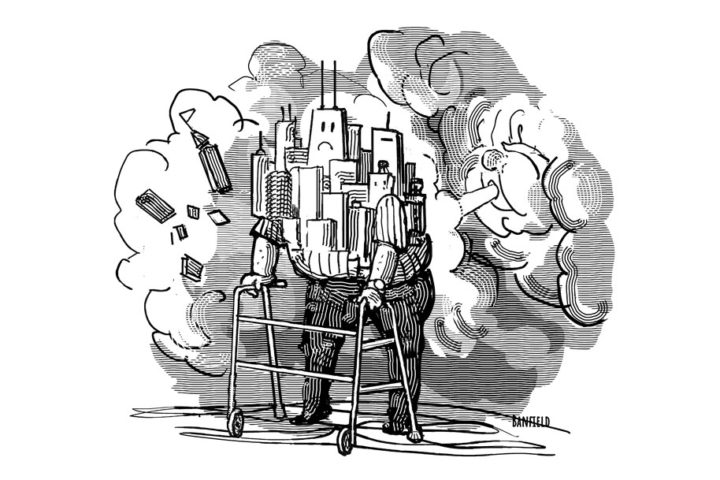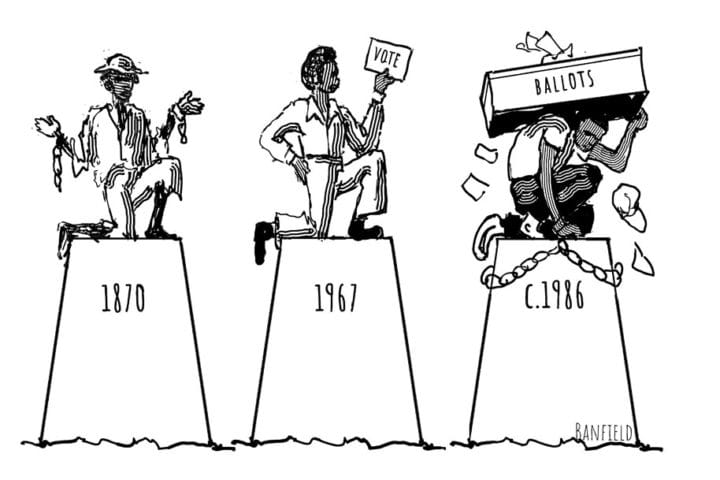Book Reviewed
In his new book, Human, Forever: The Digital Politics of Spiritual War, James Poulos has taken up the great task of his generation by telling of the digital apocalypse. The men and women of Generation X, born in the ’60s and ’70s, are old enough to remember a world before the internet. But they are also young enough to be fully conversant with the radically new media and technology of the digital age.
Poulos helped found the Claremont Institute’s online magazine, the American Mind, of which he is now the editor. He is well placed to help readers navigate the digital revolution. A student of the political philosophy of Alexis de Tocqueville, he appreciates the classical ideals and local folkways that have always shaped America’s heart and character. As a close reader of the seminal media theorist Marshall McLuhan, he understands that our digital transformation poses unique challenges to our traditional way of life.
Poulos is not warning of a catastrophe to come but unveiling one in whose aftermath we are already living. The French philosopher Paul Virilio, upon whose work Poulos draws to precise and powerful effect, observed that every new technology brings into the world with it a new disaster. To invent the ship is to invent the shipwreck. The advent of the powered machine inaugurated an age of man-made calamities on a mythical scale.
From the sinking of the Titanic to the Bhopal gas leak, the creations of the industrial age often turned on mankind with a strong wrath previously reserved for the gods. And yet, for all their destructive power, industrial catastrophes remained localized. They were something we might avoid, or at least run away from, like a tornado or a giant lizard attacking a city. It was only at Chernobyl that we began to glimpse the world-encompassing potential of technological catastrophe—but already by then, the heralds had announced the birth of a new form of machine, and with it a new kind of malfunction. There is no running or hiding from the disaster of the digital age.
* * *
Virilio coined the term “integral accident” to describe disasters that cause unpredictable cascading failures, because their various parts have become too complex and interdependent for even their inventors to understand their activity in real time. When we come to rely on the smooth operation of systems whose sophistication has outrun our analytical capabilities, we are helpless to fix problems faster than they appear. As Virilio explained to an interviewer, “The industrial accident is still the kind of event that ‘takes place.’ The post-industrial accident, on the other hand, goes beyond a certain place—you might say that it does no longer ‘take place,’ but becomes an environment.”
From the accumulating cloud of satellites and space debris orbiting above our planet, to the fiber-optic networks running beneath ground and sea, the term “technology” no longer refers to a tool or technique, but to the very environment in which we live, breathe, and have our being. The powers and potential benefits of this new apparatus are astounding: the worldwide mesh of digital systems and tools can resolve old-world problems with tremendous efficiency. Industrial-era disasters become less catastrophic when they take place within the fabric of digital-era tech.
For example, I remember the feeling of witnessing something momentous in 2010, when an explosion aboard the Deepwater Horizon drilling rig created a kind of artificial volcano in the Gulf of Mexico. Many experts predicted long-term biospheric damage on a previously unimagined scale. Newspapers ran op-eds suggesting that an atomic bomb be detonated at the site of the leak to cauterize the wound. But though the man-made volcano caused extensive damage, it did not “kill the Gulf,” as one energy industry expert predicted it would. Instead, as millions of people from all over the world watched in real time, remote-control robots worked a mile beneath the waves to stop the flow. Following the 24/7 livestream of this procedure was like seeing mankind, as one, working through vast collective institutions to perform microscopic surgery on the earth. As this kind of tech advances, it is at least conceivable that artificial intelligence and machine learning may one day render plane crashes, nuclear accidents, and car wrecks all but a memory.
* * *
But when this technology was born, what new disaster was clutching at its heel? Virilio described the 9/11 attacks, Hurricane Katrina, and the Deepwater Horizon oil spill as examples of how modern telecommunications technology can turn every crisis into a global one. Years into the American occupation of Afghanistan, it was revealed that many Afghans had never heard of the World Trade Center. Yet they, too, were caught up in the aftershocks of our national nightmare as it became a worldwide debacle lasting two decades.
Now consider how exponentially our interconnectedness has increased in the developed world since 2001. Compare the Kuchi nomad in Afghanistan to a suburban American housewife who uses the Citizen app on her smartphone to track every major and minor crime in her city. Everything goes into the database and becomes part of the content stream, available to witness. The same technology used to suture the Gulf of Mexico is used to remotely vaporize an aid worker in his car in Kabul. Artificial intelligence that might end our traffic problems will be used to monitor and control the movements of the Uighur population in Xinjiang.
The digital disaster Poulos describes exceeds even Virilio’s vision, for the scene of this accident is not the power plant or shipping lane, but the human mind and soul. The tech that surrounds us has also demoralized us: our bots are so powerful, so swift, and so much smarter than us that it seems as if there may be little need for humanity at all. Out of the acid dreams of a handful of brilliant Californians has emerged a technology so powerful that, as Poulos writes, “it now rules the world.”
Moreover, the massive investment of government funds and effort in these tools has created a fusion of public and private power which makes it difficult to draw the line between tech and state. Gone are the days of the garage start-up: Poulos recounts, for example, how Google’s growth was buttressed by vast grants from the CIA and NSA to track and monitor Americans. “Technology,” he writes, “has advanced to a point where it justifiably seems almost impossible that any truly private-sector person or group of people can innovate for reasons other than those of state.”
The shape of this new regime was foretold by the Beat-generation novelist William S. Burroughs in 1958, one year before the U.S. Patent Office blessed the first microchip. There would be no more Hitlers, no more Stalins, wrote Burroughs. In place of the “iron-willed dictator” would rise “rulers-by-accident,” elevated by random pressures to wield absolute power over “a vast machine they cannot understand, calling in experts to tell them which buttons to push.” Man had created a technology powerful enough to program the world, forgetting that we men are part of the world ourselves.
* * *
This is the meaning of Poulos’s title: the crucial task before us is to remain Human, Forever, recovering a sense of ourselves as God-created beings whose virtue and flourishing is non-negotiable. “What really needs saving, and what is going unsaved,” according to Poulos, is “our souls.” Our digital tools, operating according to their own logic and veering out of even the most expert control, are threatening to eclipse basic human concerns, like privacy and connection, in the interest of cold digital imperatives like interoperability and control. Our challenge is to re-exert authority over these machines, making them operate according to the exigencies of our souls rather than the other way around. In Poulos’s terms, we must “catechize the bots.”
Thus Poulos refers to Marshall McLuhan’s dictum that “we shape our tools, then our tools shape us.” But even McLuhan had in mind a human race that remained largely grounded in the real world, no matter how much time humans spent in front of the television. The deeper intimacy of the smartphone blurs the line between our own thoughts and the content we consume. Members of each successive generation invest more of their identity into online forums, subjecting a greater part of themselves to a realm where the bots’ influence is absolute. As it dawned on politicians and power brokers that more and more people were devoting their time and attention to these digital venues, many have scrambled to catechize the bots on their own terms, for instance by enforcing “anti-racist” rules for A.I. and search engines, or demanding compliance to an international COVID tracking regime.
But these efforts have fallen flat because they are attempts to exert worldwide rule over a technology that is already ruling the world. Instead, Poulos counsels investment in the local and the particular. We can get a handle on our digital tech if we use it within the manageable context of small communities where our humanity can really assert itself in face-to-face encounters. Poulos’s own publishing process is a practical exercise in this sort of thinking: rather than going through a massive conglomerate, he made his book available on the decentralized cryptocurrency market canonic.xyz. Without too much advanced training, regular Americans can use platforms like canonic to bypass old institutions and take control of their own property and lives.
* * *
If we begin from the given realities of our relationships and needs in space and time, we can make our bots serve us rather than subjecting ourselves to the flattening power of digital domination. This is a hopeful way forward for America, in particular, which has always contained a patchwork diversity of local communities. “Under digital conditions,” Poulos writes, “the world structurally resists uniformity and unity…. Digitized America retains the fundamentals of its civilizational character, including the most important, its pluralism.”
For this reason, any attempt to build the universal state using digital technology is bound to fail. The concern, as always, is whether our ruling factions will go out with a bang or a whimper. The rulers of this and every other country equate their inability to control events with a state of emergency, so there is cause for real worry when they stake everything on an impossible task. Alas, there will be no Oval Office address, no official declaration of national emergency, in the wake of the digital disaster. The challenge of remaining human in the post-disaster world is one we must face without support from industrial-age institutions which have been incorporated into territory already conquered by the cyborgs and digital swarms. But that does not mean we must go it alone. Poulos refuses to lie to the reader or to peddle false hope, but nevertheless manages to leave one with a firm certainty that it is humanity’s war to win—if only we show up to fight.




